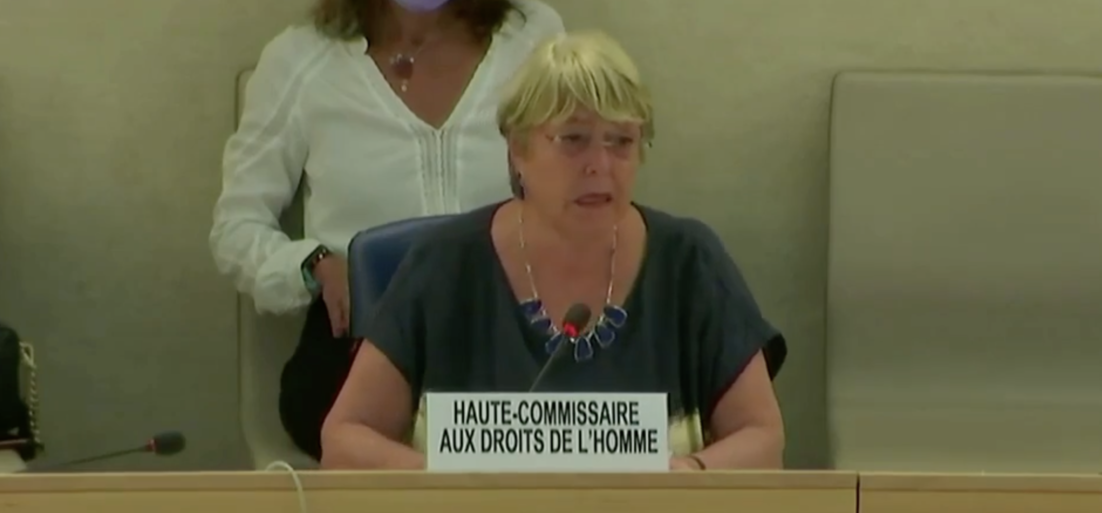UN High Commissioner: The Nicaraguan government must guarantee full civil and political rights for all
Washington, D.C. September 13, 2021. United Nations High Commissioner for Human Rights Michelle Bachelet presented her second oral update on the human rights situation in Nicaragua before the UN Human Rights Council […]

Washington, D.C. September 13, 2021. United Nations High Commissioner for Human Rights Michelle Bachelet presented her second oral update on the human rights situation in Nicaragua before the UN Human Rights Council (UNHRC) on Monday, September 13. In her update, Bachelet lamented the deterioration of civil and political rights in the context of Nicaragua’s general elections, referring to multiple arbitrary detentions carried out since May 2021. Several of these detentions, particularly the detentions of women, contain elements of isolation, lack of communication with the outside world, and lack of due process, raising questions of torture and other mistreatment.
Bachelet also stated that resolving Nicaragua’s human rights crisis will require participation from all sectors of society. In describing the repression surrounding the upcoming elections, she explained:
“Nicaraguans should be able to exercise their right to vote without intimidation, violence, or administrative interference. Those who wish to do so should be able to freely present their candidacies…It is also essential that the media be able to cover the electoral campaigns of all candidates…None of this is happening in Nicaragua.”
Since May 28 of this year, the Office of the UN High Commissioner for Human Rights (OHCHR) has documented arbitrary detentions and prosecutions of more than 30 people, including human rights defenders, business leaders, campesino activists, student leaders, and six possible presidential candidates.
Meanwhile, the OHCHR has reported an intensification of attacks against freedom of the press, restrictions on freedom of association, increased violence against indigenous peoples in the Caribbean Coast region, and a lack of official public information about the numbers of COVID-19 deaths and cases.
According to the OHCHR, at least 12 journalists and other media workers have fled the country as a result of arrests, police harassment, and threats by the Public Ministry and police. The OHCHR has also highlighted the police raids, confiscations, and arbitrary detentions used by public forces against the independent newspaper Diario La Prensa.
Bachelet reminded the Council that the Nicaraguan National Assembly has canceled the legal registrations of 45 NGOs, including international organizations, women’s rights groups, and medical organizations that questioned the government’s COVID-19 response.
Bachelet also emphasized that on August 23, at least nine indigenous Nicaraguans were killed in an attack related to land disputes in the Sauni As indigenous territory, located in the Northern Caribbean Coast Autonomous Region. She stated that “homicides and aggressions related to territorial disputes registered in the same area since January 2020 remain unpunished.”
Bachelet insisted that it is the Nicaraguan government’s duty to guarantee the full exercise of its citizens’ civil and political rights; end repression against the political opposition, the press, and civil society; and immediately liberate the 130 people who have been detained since Nicaragua’s crisis began in April 2018.
Finally, Bachelet called on the Council to consider all measures at its disposal to protect and promote human rights in Nicaragua, pledging her Office’s resources to assist these efforts.
Statement
The International Institute on Race, Equality and Human Rights (Race and Equality) joins High Commissioner Michelle Bachelet in calling upon the UN Human Rights Council (UNHRC) to redouble its efforts to address Nicaragua’s human rights crisis.
In particular, we support her calls for the government of Nicaragua to implement the recommendations issued in Human Rights Council Resolution 46/2. These recommendations mark the best path for Nicaragua to ensure justice and reparations for victims of human rights violations. Our independent framework to monitor the implementation of Resolution 46/2, however, indicates that the government has failed to comply with any of its recommendations.
We also call upon the government to end its repression of human rights defenders, journalists, and members of the political opposition; to release all those imprisoned for political reasons; to implement the recommendations issued by the OHCHR, the UNHRC, the United Nations Special Procedures, and the Inter-American Commission on Human Rights; and to comply with the decisions of the Inter-American Court on Human Rights.
We urge Nicaraguan civil society, the media, and the entire international community to join forces to continue monitoring, documenting, and condemning human rights violations in Nicaragua.
For more information about the human rights situation in Nicaragua, please contact Race and Equality’s Legal Advisor, Tania Agosti (Agosti@RaceandEquality.org)

